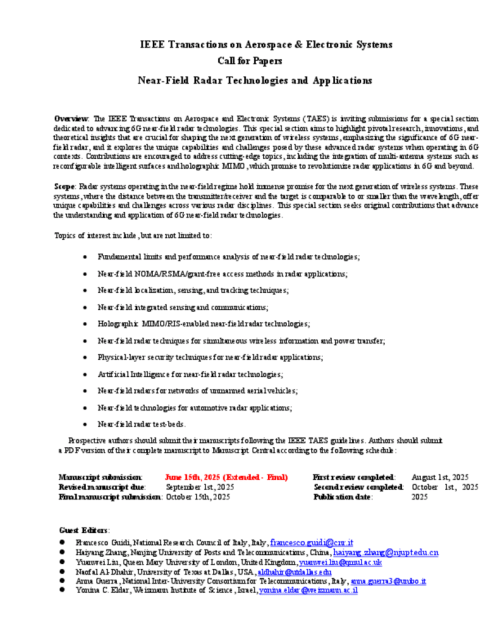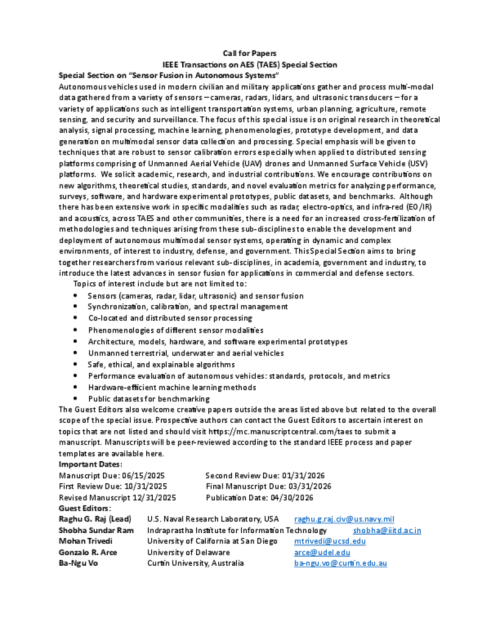IEEE Transactions on Aerospace and Electronic Systems
Publication Menu
IEEE Transactions on Aerospace and Electronic Systems focuses on the organization, design, development, integration, and operation of complex systems for space, air, ocean, or ground environment. These systems include but are not limited to, navigation, avionics, spacecraft, aerospace power, radar, sonar, telemetry, defense, transportation, automated testing, and command and control.
The articles in this journal are peer-reviewed in accordance with the requirements set forth in the IEEE PSPB Operations Manual (sections 8.2.1.C & 8.2.2.A). Each published article was reviewed by a minimum of two independent reviewers using a single-blind peer-review process, where the identities of the reviewers are not known to the authors, but the reviewers know the identities of the authors. Articles will be screened for plagiarism before acceptance.
Corresponding authors from low-income countries are eligible for waived or reduced open access APCs.
Paper Submission Portal for New Submissions
Paper Submission Portal for Submissions Prior to March 4, 2025
Letters Category to be Discontinued on 31 December 2022
Due to a small number of submissions and difficulties providing quick decisions, the TAES Letters category will be discontinued on 31 December 2022. The correspondence item category remains open and should be used by authors who wish to submit a short manuscript to crisply report a singularly important result.
AESS Transactions contains the highest quality technical papers which detail scientific findings in the many systems-related technology areas served by AESS. A great deal of time and volunteer effort is expended to ensure that each paper is fully reviewed and vetted for its content and quality. The goal of Transactions is to improve and enhance the foundations of science on which Systems are conceived, designed and physically realized. Proof of their quality is the fact that frequently, Transactions papers continue to be referenced by the technical community for many years after their publication.
The IEEE Transactions on Aerospace and Electronic Systems publishes articles bi-monthly with aerospace or related applications. The areas of interest are naturally quite wide and include space, avionics, guidance & control, navigation, power conversion systems, command & control, and, of course, radar. Aerospace ideas have wide applicability, hence other topics include intelligent & fault-tolerant systems, target tracking, multi-sensor systems, electro-optic and infrared sensing, sensor network management, large-scale systems and systems-of-systems, and even sonar.
It is expected that each manuscript is a novel contribution with strong scientific underpinning, clear development and good English. Manuscripts undergo a rigorous web-based peer-review process, with typical review cycles in the order of 60 days. Regular papers show a thorough development of an idea or topic, while correspondence items are somewhat shorter; the difference is in scope, rather than quality.
Special Sections
The Transactions does not have Special Issues due to the bi-monthly publication cycle. However, occasionally Special Sections on a particular topic share an issue with the regular papers. For information about proposing a Special Section, please see IEEE Transactions on AES Special Section: Procedures and Guidelines for Proposals.
Open Access
In accordance with IEEE policies regarding open access (OA) content, the AES Transactions has become a “hybrid” journal for submissions dated November 1st, 2012, or later. This means that authors have the choice between the traditional publication model and an OA model. The former is the familiar procedure in which an accepted article is available on IEEEXplore to subscribers of that service. Under the OA model, the author of an accepted manuscript chooses to pay a fee, such that the manuscript is posted on IEEEXplore and available, free, to all. IEEE’s open access article processing charge (APC) for all hybrid journals is $2195 USD. This figure is independent of manuscript type (regular, correspondence or letter).
*ORCID*
All IEEE journals require an Open Researcher and Contributor ID (ORCID) for all authors. ORCID is a persistent unique identifier for researchers and functions similarly to an article’s Digital Object Identifier (DOI). ORCIDs enable accurate attribution and improved discoverability of an author’s published work. The author will need a registered ORCID in order to submit a manuscript or review a proof in this journal.
Other Policies:
-
Call Doc CategoryTAES
-
Call Doc CategoryTAES
Recent Past Call Documents:
-
Deadline:Call Doc CategoryTAES
-
Deadline:Call Doc CategoryTAES
-
-
Deadline:Call Doc CategoryTAES
-
-
Deadline:Call Doc CategoryTAES


